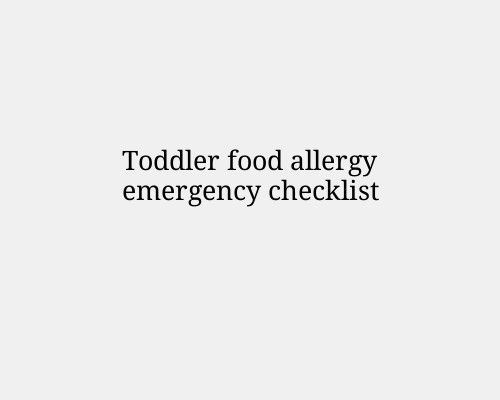
Here’s a printable Toddler Food Allergy Emergency Checklist, designed for quick reference at home, day care, or on the go.
🍼 Toddler Food Allergy Emergency Checklist
Print and keep in emergency kits, on the fridge, and in your wallet.
1⃣ EMERGENCY MEDICINES
2 × Epinephrine auto-injectors (EpiPen Jr., Auvi-Q, Jext 150 µg)
Antihistamine syrup/tablets (pre-measured dose)
Inhaler + spacer (if prescribed for asthma)
Keep all meds in original packaging, check expiry monthly.
2⃣ OTHER ESSENTIAL SUPPLIES
Written Allergy Action Plan (signed by doctor)
Medical info card (photo + contact details + allergen list)
Allergen-free snacks
Wet wipes (clean hands/surfaces)
Nitrile gloves (for caregivers)
Small waste bag (for used injectors/gloves)
3⃣ WHEN TO USE EPINEPHRINE
Give immediately after allergen exposure if child has:
Trouble breathing / wheezing / persistent cough
Swelling of tongue, lips, face, or throat
Hoarse voice / difficulty speaking or swallowing
Widespread hives + vomiting, diarrhoea, or stomach pain
Dizziness, fainting, pale/floppy
Rapidly worsening symptoms
💡 Always call emergency services after giving epinephrine
(SA: 10177 ambulance, or 112 on cell phone)
4⃣ STORAGE RULES
Epinephrine: room temp (20–25 °C), insulated in heat, never refrigerate or freeze.
Antihistamines: room temp, avoid sunlight (check label for special instructions).
Keep travel kit in insulated pouch when outdoors.
5⃣ MEDICAL ID BRACELET
Should read:
[CHILD’S FIRST NAME] SEVERE FOOD ALLERGY EPINEPHRINE REQUIRED ALLERGEN: [LIST]
ICE: +27 XXX XXX XXX
(Breakaway or silicone adjustable for toddlers)
✅ Tip: Keep duplicate kits at home, day care, grandparents, and in each family vehicle.
✅ Tip: Review the plan with all caregivers every 3–6 months.
✅ Tip: Replace medicines before expiry; mark replacement date in your calendar.